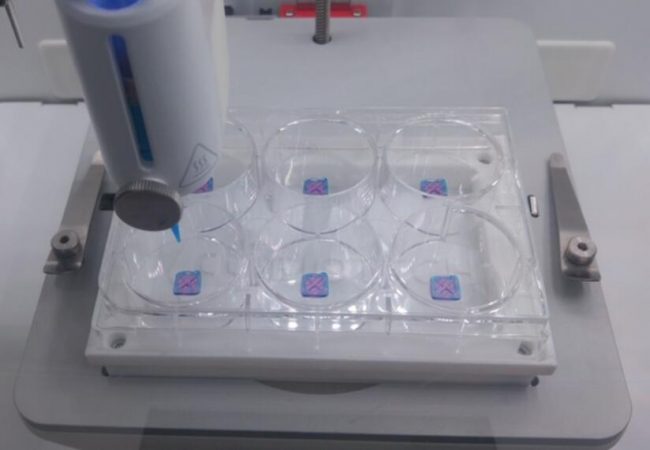BASF Care Creations® (personal care business) under the chemical materials company BASF and CTIBiotech, a cell therapy research institute, have reached a milestone cooperation. The two parties announced the development of immune macrophages, including immune macrophages.3D bioprintingSkin model.Biologically active3D printingThe skin model will be used for the testing and development of skin care products.
biology3D printingSkin model. Source: BASF
![]() Rapid development of highly reliable cosmetic materials
Rapid development of highly reliable cosmetic materials
CTIBiotech’s Biology3D printingThe combination of skin models will provide strong support for BASF scientists to carry out skin care research on the function of macrophages.Immune macrophages continuously monitor the skin’s microenvironment to give “indications” to cellular stress, tissue damage or infection. They are essential for closing wounds and completely regenerating tissues. Macrophages have a high degree of plasticity, can promote or inhibit inflammation, and maintain the homeostasis of the skin.
Compared with the current commonly used in vitro experimental methods, the immune function developed by CTIBiotech3D printingSkin tissue will enable BASF scientists to analyze human physiology and the immune function of macrophages, helping BASF scientists to speed up the development of highly reliable skin care materials.Normal immune response3D printingSkin tissue provides the basis for BASF to develop advanced cosmetic materials.
The cooperation between BASF and CTIBiotech began in 2011. In 2015, the two parties began to carry out research on 3D tissue models, which were applied to the development and testing of biologically active substances for skin care. In 2018, they announced their first research results: in a 3D human sebaceous gland model, long-term physiological sebum culture was carried out in vitro, and this sebum production was regulated by active ingredients.
Human tissue models or organoids cultured in vitro through biotechnological means have certain significance for the testing of drugs and cosmetics products.In addition to conventional tissue engineering techniques, through biological3D printingIt can also realize human tissue model or organoid culture.Cosmetic manufacturers are promoting biological3D printingArtificial skin tissue has played an important role in the application process.biology3D printingThe company Organovo and L’Oréal (USA) have cooperated to advance3D printingFor the application of skin in cosmetic experiments, Chinese cosmetics company Jialan Group has launched a test3D printingAsian skin organization, developed by the Taiwan Industrial Research Institute for the characteristics of Chinese skin3D printingSkin tissue EPiTRI, this product can help cosmetic manufacturers develop materials and formulations that are consistent with international regulations and testing guidelines such as OECD431 and OECD439.
(Editor in charge: admin)



0 Comments for “BASF will use 3D printed skin tissue with immune macrophages in the test”